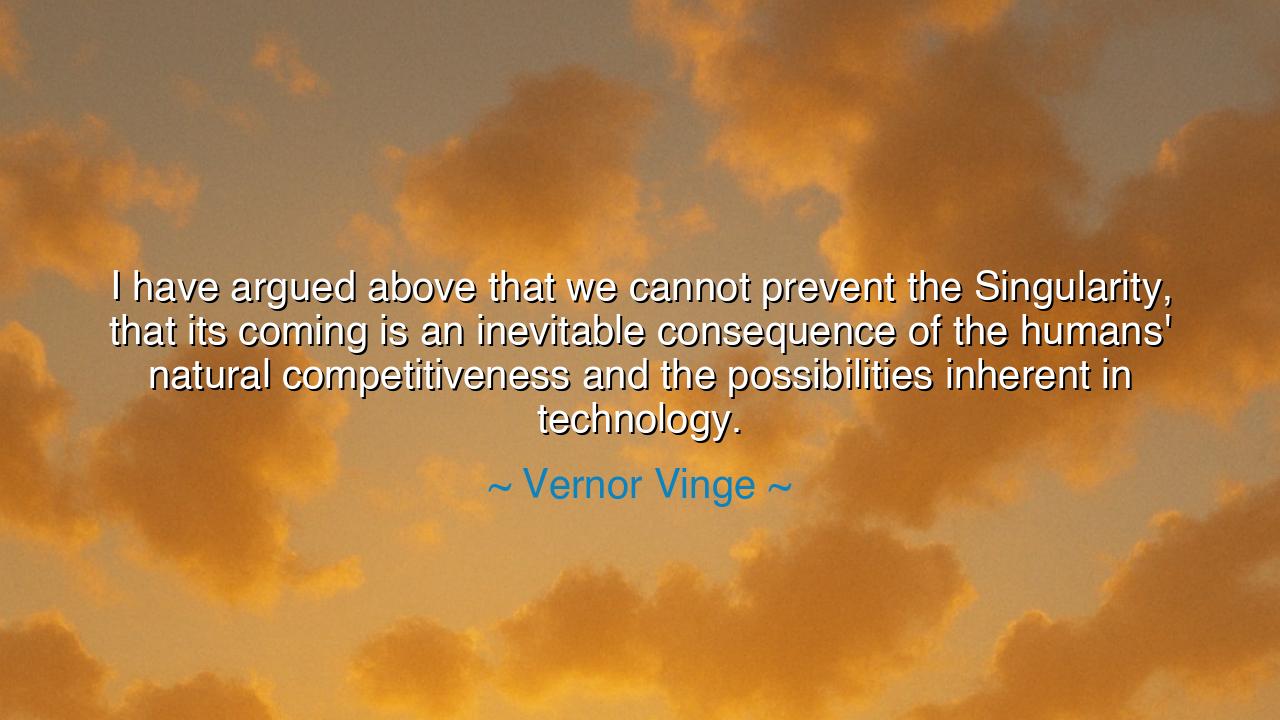
I have argued above that we cannot prevent the Singularity, that
I have argued above that we cannot prevent the Singularity, that its coming is an inevitable consequence of the humans' natural competitiveness and the possibilities inherent in technology.






Hear the prophetic words of Vernor Vinge, spoken with both awe and dread: “I have argued above that we cannot prevent the Singularity, that its coming is an inevitable consequence of the humans’ natural competitiveness and the possibilities inherent in technology.” These are not the words of idle speculation, but of a seer who looked into the unfolding horizon of mankind’s destiny and saw a storm unlike any before. In his voice, there is no question of if, but only of when—for he declares that the Singularity is not a choice, but the fruit of forces that lie deep within the heart of humanity itself.
When Vinge names the Singularity, he speaks of that moment when machines, guided by human hands, will surpass their makers in intelligence, speed, and capability. It is the point beyond which the path is hidden, as when a traveler stands before a mountain pass shrouded in clouds. What lies beyond, none can fully say, but the crossing itself cannot be avoided. For human beings, driven by competitiveness, always strive to surpass one another—whether in war, in trade, in invention, or in ambition. This restless striving ensures that the tools of power will grow, and once they grow beyond our own measure, the Singularity dawns.
The truth of this can be seen in the ancient tale of Prometheus, who stole fire from the gods and gave it to mankind. That flame, once kindled, could not be returned. It brought warmth, light, and civilization—but also weapons, destruction, and ruin. So too with technology: once discovered, it is never forgotten. Nations compete, inventors race, and rivals build upon one another’s work. Even when dangers are seen, restraint is rare, for ambition and fear drive men forward. Thus Vinge’s warning: the Singularity is not a possibility, but a destiny born of human nature itself.
History, too, testifies to this relentless advance. When the atomic age began with the splitting of the atom, many cried out for restraint. Yet even in the face of peril, nations rushed to build bombs, each unwilling to be left behind. The result was power beyond comprehension, kept at bay only by fragile treaties and mutual fear. If such was true of nuclear fire, how much more will it be so of intelligent machines, whose growth may be swifter, subtler, and less easily contained? The pattern is clear: human competitiveness ensures that no great discovery lies dormant for long.
And yet, Vinge’s words are not despair, but revelation. If the Singularity cannot be prevented, then it must be faced with courage and wisdom. To deny it is to close our eyes to the onrushing tide. To fear it without preparation is to drown in its depths. But to accept its inevitability is to take up the burden of responsibility: to shape, guide, and channel the forces of technology, so that they may serve creation rather than destruction. The storm cannot be stopped, but the ship can be steered.
The lesson for us is profound. Do not waste your energy clinging to illusions of control over the tide of progress. Instead, seek wisdom, foresight, and virtue, so that when the tide rises, you are not swept away. Just as sailors of old learned to harness the wind that once terrified them, so must we learn to harness the winds of technology. This means cultivating both skill and morality, knowledge and humility. For without virtue, power becomes ruin; but with virtue, power becomes light.
Practically, this means preparing yourself and your children not only to use technology, but to master the discernment of its purpose. Learn to question its direction, to shape its use with ethics, to resist the greed and fear that drive blind acceleration. At the same time, accept that change cannot be held back by chains. Instead of saying, “let us stop this,” say, “let us guide this.” For only in guidance is there hope of survival and flourishing.
Thus the words of Vernor Vinge stand as prophecy for the generations: the Singularity is coming, born of our own competitiveness and the unstoppable growth of technology. It cannot be averted, but it can be faced. Let us then prepare, not with denial or despair, but with wisdom, courage, and unity. For though the mountain pass is shrouded in mist, those who walk with clear hearts and steady hands may yet find that what lies beyond is not doom, but a new dawn.






AAdministratorAdministrator
Welcome, honored guests. Please leave a comment, we will respond soon